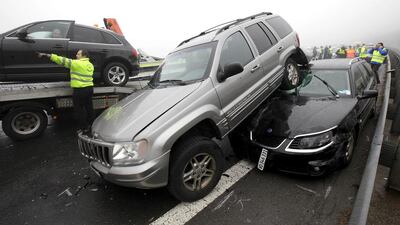With recent terror attacks in Paris and Mali, the business traveller would be forgiven for refusing to leave the UAE. But risk analysis experts say security is less of an issue than traffic accidents or a lack of hospitals.
A recent survey by YouGov for International SOS, which provides international travel advice and emergency services and repatriation, found that 39 per cent of business travellers thought about political uncertainties and 43 per cent high-profile terror attacks – but only 4 per cent considered road safety or the robustness or a country’s medical infrastructure.
Yet three of the most dangerous countries for driving in the world are in the Middle East, according to the World Health Organization – Iran, Iraq and Oman.
“Extreme and unusual events distort perceptions of risk,” says Julian Moro, regional security director at International SOS and Control Risks in Dubai. “Whilst devastating, travellers are far more likely to be involved in a traffic accident or suffer a medical emergency that requires specialised care. Having an insurer ready to pay is insufficient if the medical infrastructure is not in place to provide it.”
And, as Mr Moro points out, embassies are likely to advise not to visit “risky” locations – often the very emerging and developing markets businesses want to expand into.
“Threat is pervasive but it is not everywhere all the time,” agrees Marc Josselin, operations director of security and risk advisory consultancy Whispering Bell.
“There are few changes to good travel advice. The term for businesses is duty of care.”
Other countries that travellers apparently have a misperception of are Turkey – which International SOS deems low risk (apart from some of the south-east), while one in five surveyed thought it a high security threat – and Jordan, which a quarter of western respondents thought was high-risk.
“It’s no coincidence that the companies showing a duty of care to their staff are the successful ones,” says Mr Josselin. “It’s a demonstrable sign of good management, and staff are likely to reward the employer who looks after them.”
q&a safety while on the road
Suzanne Locke reveals the safest way for executives to travel:
With Iran opening up for business, how safe is it to visit?
While 54 per cent of the survey respondents saw it as a high-risk security destination, International SOS says Iran is one of the safest countries in the region to visit (away from the border areas near Afghanistan and Pakistan), with a similar risk rating to the UAE and much of Europe.
What can I do if there is a problem at my hotel?
“An attack against a hotel is a once-in-a-lifetime event; 99.99 per cent of people will never experience it. But whether for security or fire, the best advice is still to follow your instinct and get away from the location,” says Mr Josselin of Whispering Bell. He cites the example of a Dubai business that several years ago lost several staff in a hotel fire in Erbil, northern Iraq, because of bad wiring in the shop below.
What can a business do to mitigate risk?
Organisations should brief travellers thoroughly before trips, says Mr Moro. Mr Josselin says companies should ensure staff stay in pre-approved hotels, have a meet and greet service at the airport and try to restrict movement outside work.
What can an individual do?
Use hotel cars and limousine services rather than taxis or buses, where the safety of either vehicle or driver cannot be ensured, says Mr Josselin. Develop your own “situational awareness” – know where the fire exits are. Check your medical insurance covers you. And have emergency phone numbers saved on your phone.
business@thenational.ae
Follow The National's Business section on Twitter

